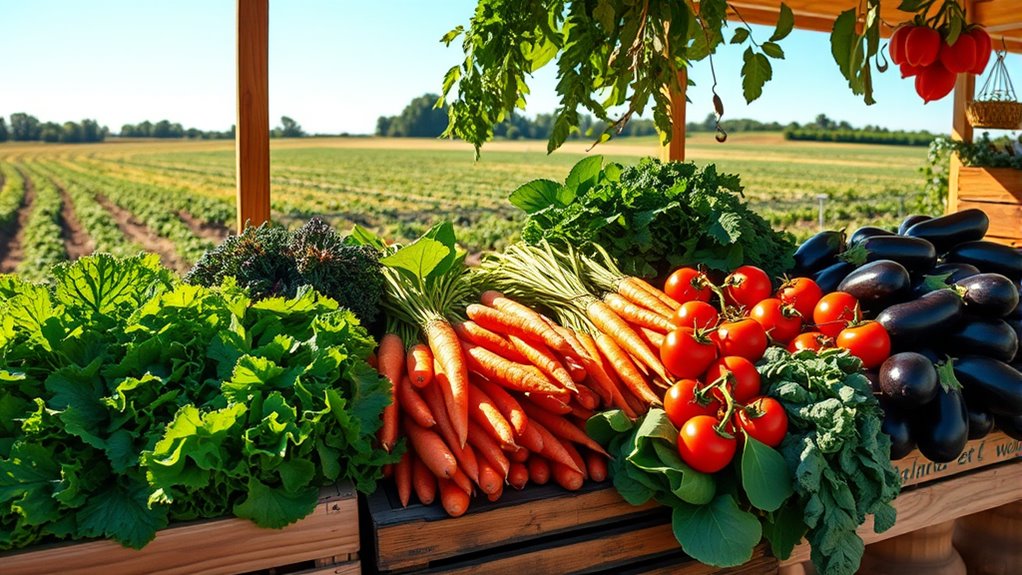Switching to a plant-based diet helps you cut down your environmental impact considerably. It conserves resources like water and land, and reduces greenhouse gas emissions linked to animal farming. Eating locally and seasonally can boost these benefits further by lowering transportation-related emissions. Plus, plant proteins like beans and lentils are generally cheaper and easier to produce, encouraging sustainable farming practices. To uncover more ways your food choices can protect the planet, keep exploring these eco-friendly options.
Key Takeaways
- Plant-based diets reduce greenhouse gas emissions by minimizing reliance on animal agriculture.
- They conserve water and land resources compared to livestock farming practices.
- Choosing local and seasonal plant foods lowers transportation emissions and supports sustainable regional agriculture.
- Plant proteins are more resource-efficient, requiring less land, water, and energy to produce.
- Overall, plant-based diets decrease the ecological footprint of food production and promote environmental sustainability.

Plant-based diets are gaining popularity as more people seek healthier, sustainable ways to eat. You might wonder why so many are turning to plant-based foods, and the answer lies partly in the positive environmental impact. When you choose plant-based options, you’re supporting sustainable farming practices that use fewer resources and produce less pollution. Unlike traditional animal agriculture, which demands large amounts of land, water, and feed, plant-based diets focus on plant protein sources that are more efficient to grow. This shift helps reduce greenhouse gas emissions, preserve natural habitats, and conserve essential resources.
By incorporating more plant-based foods into your meals, you contribute to a more sustainable food system. Growing plant protein sources like beans, lentils, tofu, and nuts requires considerably less land and water compared to raising livestock. This means less deforestation, less water depletion, and reduced soil erosion. You’re also helping cut down on methane emissions, a potent greenhouse gas produced by livestock. Every plant-based meal you choose lessens the environmental burden that animal agriculture often leaves behind.
Furthermore, plant-based diets tend to promote local and seasonal eating, which can further lessen your carbon footprint. When you buy local produce, you cut down on transportation emissions and support regional farmers who often practice sustainable farming techniques. This creates a cycle where your dietary choices help maintain the health of ecosystems and promote more responsible land use. Sustainable farming practices, such as crop rotation and organic methods, are often used for plant protein sources, ensuring that the environment stays healthier for future generations.
You also benefit from the efficiency of plant-based proteins. They tend to be more affordable and easier to produce on a large scale, making plant-based diets accessible to more people. As demand for plant protein sources grows, farmers are more incentivized to adopt eco-friendly practices that minimize chemical use and soil degradation. This transition to plant-based eating isn’t just about personal health; it’s a conscious effort to lessen your ecological footprint. Additionally, utilizing renewable energy sources for the production and transportation of plant-based foods can further decrease their environmental impact.
Frequently Asked Questions
How Do Plant-Based Diets Affect Global Water Resources?
By adopting a plant-based diet, you help conserve water resources because plant foods generally require less water than animal products. This reduces the need for extensive crop irrigation, which strains water supplies. When you choose plant-based options, you’re actively supporting water conservation efforts, decreasing the demand for water-intensive farming practices, and easing pressure on global water resources, ultimately contributing to a more sustainable and resilient environment.
What Is the Carbon Footprint Difference Between Plant-Based and Omnivorous Diets?
You’ll find that plant-based diets produce markedly smaller carbon footprints than omnivorous ones. By reducing meat consumption, you cut down on greenhouse gases like methane and carbon dioxide, which are major contributors to climate change. Switching to plant-based foods helps you reduce your environmental impact, as livestock farming is a leading source of emissions. So, choosing plants over proteins from animals makes a meaningful difference in shrinking your ecological footprint.
Are Plant-Based Diets Sustainable in Developing Countries?
Yes, plant-based diets can be sustainable in developing countries. You can promote urban agriculture to grow local produce efficiently and reduce reliance on imports. Cultural acceptance plays a critical role; if plant-based foods align with local traditions, adoption becomes easier. Encouraging community involvement and education helps integrate these diets sustainably, supporting environmental goals while respecting cultural values. This approach fosters resilience and healthier food systems in developing regions.
How Do Plant-Based Diets Impact Biodiversity?
Plant-based diets help protect biodiversity by reducing pressure on biodiversity hotspots, where native species thrive. When you choose plant-based foods, you lower the need for land conversion and habitat destruction, preserving native species and their ecosystems. This shift supports conservation efforts, maintains ecological balance, and reduces the risk of losing unique biodiversity hotspots. Your food choices can directly contribute to safeguarding biodiversity and ensuring the survival of diverse native species.
What Are the Environmental Benefits of Locally Sourced Plant Foods?
Think of locally sourced plant foods as your environmental compass. When you choose them, you reduce food miles, cutting down on transportation emissions. This supports sustainable agricultural practices and keeps the planet healthier. By eating local, you also promote biodiversity and strengthen local economies. Your simple choice can be a powerful act of conservation, helping to preserve ecosystems and reduce pollution—making your diet a beacon of positive change.
Conclusion
Switching to a plant-based diet can substantially reduce your environmental footprint. Did you know that plant-based diets use 52% less land and produce 46% fewer greenhouse gases? By making small changes in what you eat, you contribute to a healthier planet. So, consider incorporating more plant foods into your meals—each choice adds up. Together, your actions can help create a more sustainable future for everyone.









